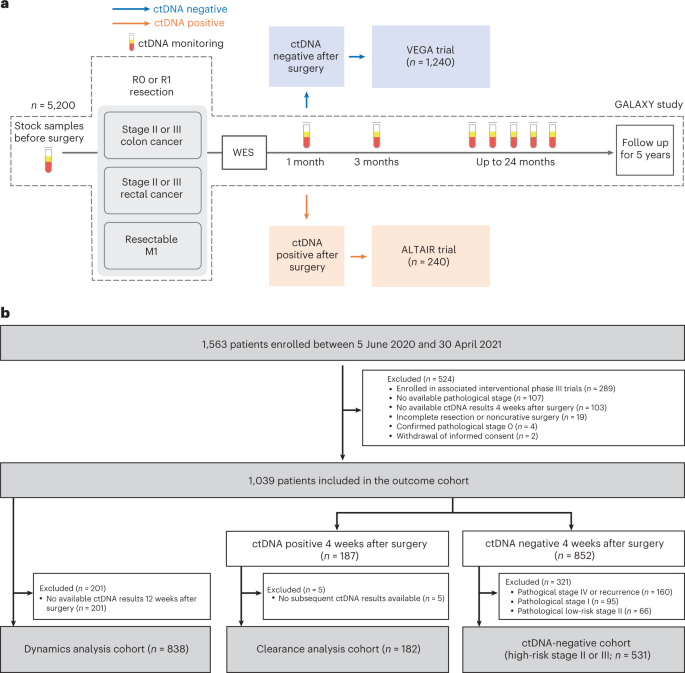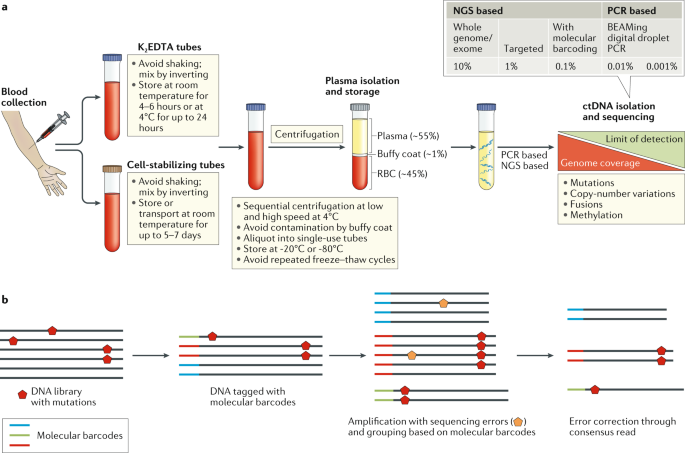ctDNA-Guided Chemo Escalation Fails to Improve RFS in Colon Cancer
Escalated adjuvant chemotherapy, guided by ctDNA, did not improve recurrence-free survival for stage III colon cancer patients, according to the findings of the DYNAMIC-III trial.
Utilizing circulating tumor DNA (ctDNA) as a prognostic indicator, the study revealed that escalated adjuvant chemotherapy did not result in improved recurrence-free survival (RFS) in patients with stage III colon cancer. These results were based on cohort data from the phase 2/3 AGITG DYNAMIC-III trial, which was presented at the 2025 American Society of Clinical Oncology Annual Meeting 1.
Study Findings
After a median follow-up of 42.2 months, the results showed that patients who received ctDNA-informed treatment escalation had a 2-year RFS rate of 52%, compared to 61% in patients who received standard adjuvant chemotherapy. However, this difference was not statistically significant (HR, 1.11; P = 0.57). Similarly, the 3-year RFS rates were 48% and 52% in the two groups, respectively.
Lead study author Jeanne Tie, MD, emphasized that "treatment escalation, including to FOLFOXIRI, did not impact ctDNA clearance or recurrence-free survival." She suggested that future studies should explore novel adjuvant strategies for this high-risk patient population.
Recurrence Risk in Stage III Colon Cancer
For patients with stage III colon cancer and detectable ctDNA after surgery, the risk of recurrence remains high despite standard adjuvant chemotherapy. The study also found that the risk of recurrence increases with higher ctDNA burden, and failure to clear ctDNA is associated with a higher recurrence risk.

Even with standard adjuvant oxaliplatin-based chemotherapy, approximately 30% of stage III colon cancer patients will experience disease recurrence. Patients with high-risk stage III colon cancer seem to benefit from 6 months of oxaliplatin-based chemotherapy compared to 3 months of treatment 2.
DYNAMIC-III Trial
The DYNAMIC-III trial aimed to assess the impact of adjuvant chemotherapy de-escalation or escalation guided by ctDNA following surgery. While the data presented focused on patients with ctDNA-positive disease, the results for ctDNA-negative patients were still preliminary.

This multicenter, phase 2/3 trial included 1002 patients with resected stage III colon cancer eligible for adjuvant chemotherapy. Patients were randomly assigned to receive ctDNA-informed management or standard-of-care therapy. Physicians selected the chemotherapy regimen before randomization, and the ctDNA result was blinded to the latter.
Key Results
Among all patients, 27% were ctDNA positive, with a mix of clinical low-risk and high-risk disease. The study assessed various factors such as baseline characteristics, treatment regimens, safety outcomes, and recurrence rates.
Overall, the study found that treatment-related hospitalization rates, treatment duration, and completion rates were similar between the ctDNA-informed and standard-of-care arms. Safety outcomes were also comparable, with similar rates of grade 3/4 treatment-related adverse effects.
An additional analysis comparing different chemotherapy regimens showed no significant differences in RFS rates, indicating that ctDNA-informed treatment escalation did not offer added benefits over standard therapy.
Overall, the DYNAMIC-III trial results suggest that ctDNA-guided chemotherapy escalation may not provide a significant improvement in recurrence-free survival for patients with stage III colon cancer.



















